Filter by
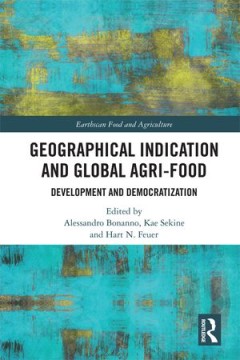
Geographical Indication and Global Agri-Food Development and Democratization
This book addresses the relevance of geographical indication (GI) as a tool for local and socio-economic development and democratization of agri-food, with case studies from Asia, Europe and the Americas. A geographical indication is a sign used on products that have a specific geographical origin and possess qualities or a reputation that are due to that origin. It provides not only a way f…
- Edition
- -
- ISBN/ISSN
- 9780429895128
- Collation
- -
- Series Title
- -
- Call Number
- -

Halal Development: Trends, Opportunities and Challenges: Proceedings of the 1…
The increasing demand for halal products, including goods and services, every year, especially for food and beverages, has resulted in a growing need for products with halal guarantees. Along with the increasing trend of the global demand, it has resulted in an increase in producers of halal food and beverages in both Muslim and non-Muslim countries. In addition the demand for halal tourism is …
- Edition
- -
- ISBN/ISSN
- 9781000416008
- Collation
- -
- Series Title
- -
- Call Number
- -
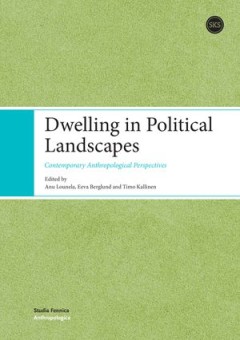
Dwelling in Political Landscapes
People all over the globe are experiencing unprecedented and often hazardous situations as environments change at speeds never before experienced. This edited collection proposes that anthropological perspectives on landscape have great potential to address the resulting conundrums. The contributions build particularly on phenomenological, structuralist and multi-species approaches to environme…
- Edition
- -
- ISBN/ISSN
- -
- Collation
- -
- Series Title
- -
- Call Number
- -
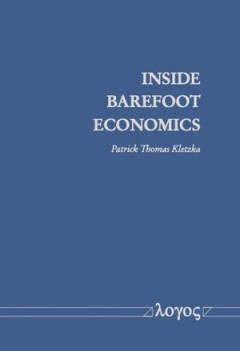
Inside Barefoot Economics
"... the practice of barefoot economics requires more than simply the lived experience of poverty-related phenomena. In contrast to the prevailing positivist paradigm within the scientific discipline of economics that tends to cultivate particular ways of economic thinking by taking their linguistic presuppositions for granted, barefoot economics involves challenging one's own horizon of possib…
- Edition
- -
- ISBN/ISSN
- 9783832553463
- Collation
- -
- Series Title
- -
- Call Number
- -
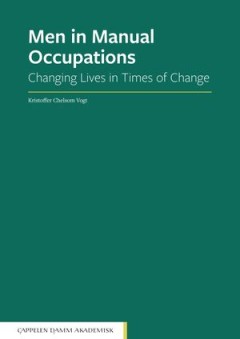
Men in Manual Occupations
A shortage of skilled workers is currently emerging in many countries. Yet public discourse and much research literature convey the impression that manual labor is somehow outmoded, requiring competencies that are no longer necessary in today’s «post-industrial, information-based society». The question of how to achieve the right balance between different types of work in a society is one t…
- Edition
- -
- ISBN/ISSN
- 9788202530945
- Collation
- -
- Series Title
- -
- Call Number
- -
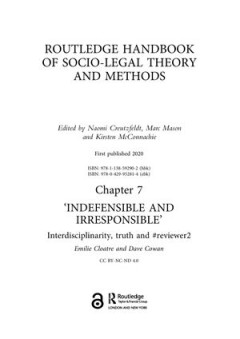
Chapter 7 ‘Indefensible and Irresponsible'
Drawing on a range of approaches from the social sciences and humanities, this handbook explores theoretical and empirical perspectives that address the articulation of law in society, and the social character of the rule of law. The vast field of socio-legal studies provides multiple lenses through which law can be considered. Rather than seeking to define the field of socio-legal studies, thi…
- Edition
- -
- ISBN/ISSN
- Taylor & Francis
- Collation
- -
- Series Title
- -
- Call Number
- -
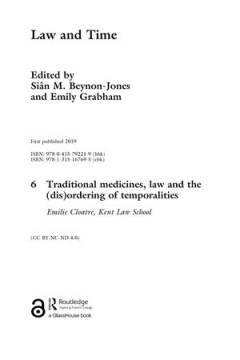
6 Traditional medicines, law and the (dis)ordering of temporalities
In this chapter, I explore the regulation of alternative and traditional medicine, in order to reflect on how particular temporalities shape, and are shaped by, the interface between law and medicine. This chapter makes two key points: first, it argues that both biomedicine and law have relied on a particular sense of ‘modernity’ as a linear temporal process; in turn, this has been key in d…
- Edition
- -
- ISBN/ISSN
- 9780415792219
- Collation
- -
- Series Title
- -
- Call Number
- -

Dynamic Finland
Finland celebrated its 85th year of independence in 2002. It is one of the thirteen countries of the world that have preserved their democracy uninterrupted since the First World War. Despite its modest origins and difficult wartime experiences, this dynamic country is now a world leader in many spheres. In 2001 it was named the world's most technologically advanced and also the least corrupt c…
- Edition
- -
- ISBN/ISSN
- 9789522228222
- Collation
- -
- Series Title
- -
- Call Number
- -
 Computer Science, Information & General Works
Computer Science, Information & General Works  Philosophy & Psychology
Philosophy & Psychology  Religion
Religion  Social Sciences
Social Sciences  Language
Language  Pure Science
Pure Science  Applied Sciences
Applied Sciences  Art & Recreation
Art & Recreation  Literature
Literature  History & Geography
History & Geography